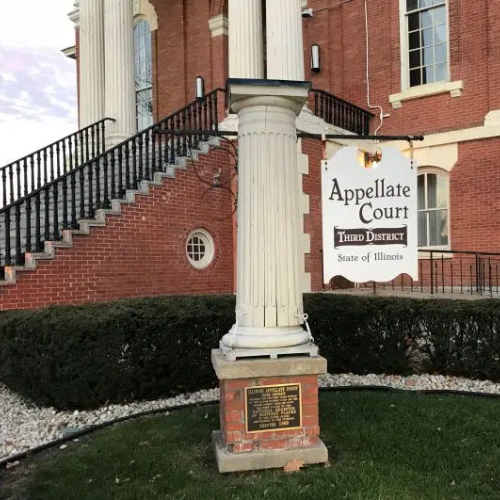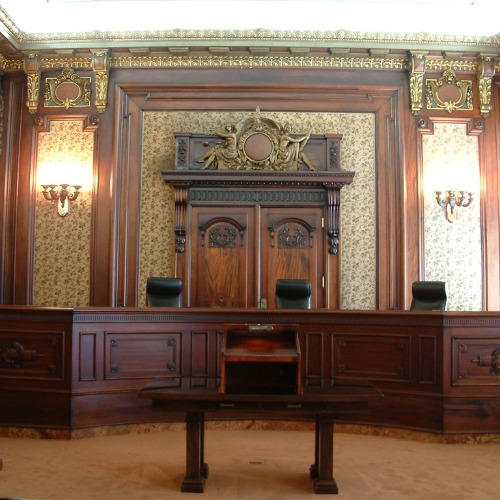February 2025 IICLE FLASHPOINTS
FEBRUARY 2025 FOCUS AREAS
Criminal Law

Third District Appellate Court Overturns Convictions Due to Improper Venue
by Matthew R. Leisten
Employment & Labor

Illinois Prohibits Employment Discrimination Against Family Caregivers
by Thomas C. Garretson
Spotlight Author Thomas P. McGarry

Our February 2025 spotlight recognizes Thomas P. McGarry, a longtime IICLE contributing author and general editor for the upcoming 2025 edition of IICLE's ATTORNEYS’ LEGAL LIABILITY. McGarry has contributed to IICLE in these roles since the handbook’s first edition back in 2002, when he proposed the idea of and outline for the handbook to IICLE publications.
Read Full SpotlightFEATURED HANDBOOKS
Criminal Law
Third District Appellate Court Overturns Convictions Due to Improper Venue
In People v. Henry, 2025 IL App (3d) 230137, the Third District Appellate Court vacated a defendant’s convictions for vehicular hijacking, attempted vehicular hijacking, armed robbery, and unlawful possession of a weapon by a felon after a trial in Will County because those offenses occurred in Cook County.
In Henry, the defendant was indicted in Will County for the above offenses in addition to aggravated fleeing to elude and striking a police animal. 2025 IL App (3d) 230137 at ¶3. At the trial, two witnesses testified about their vehicles being robbed or hijacked from them by the defendant at gunpoint in Chicago. One victim’s cell phone was also stolen from the vehicle. 2025 IL App (3d) 230137 at ¶¶8 – 10.
A state trooper located the Volkswagen on the Dan Ryan Expressway and pursued it along I-294, I-55, and I-80. The pursuit entered the Village of Shorewood in Will County, where the defendant crashed into a grassy area and fled on foot. A K-9 apprehended the defendant and was punched by the defendant. 2025 IL App (3d) 230137 at ¶¶11 – 12.
Police did not recover the firearm, and no officers saw the defendant throw anything out of his car during the pursuit. The defendant was found guilty of all charges after trial. The trial court denied the defendant’s motion to reconsider dismissing the indictment for improper venue. 2025 IL App (3d) 230137 at ¶¶13 – 14.
On appeal, the appellate court stated that defendants have a right under Article I, §8, of the Illinois Constitution to be tried in the county where the offense was committed. However, that section does not require a single and exclusive county where venue is appropriate. The venue statute of 720 ILCS 5/1-6(a) states that venue is appropriate in any “county where the offense was committed except as otherwise provided by law.” 2025 IL App (3d) 230137 at ¶19.
In a motion to dismiss for improper venue, the defendant must make a prima facie case that venue is improper. If a prima facie case is made, then the state must prove by a preponderance of evidence that the county it has selected is the proper place of trial. Courts can look to “where the acts of the offenses occurred.” 2025 IL App (3d) 230137 at ¶20.
The appellate court noted that the first hijacking victim’s incident occurred entirely in Cook County, which the state conceded. The appellate court rejected the state’s contention that theft is an element of robbery and therefore any county could be the venue as long as an element of the offense occurred in that county under People v. Eggerman, 292 Ill.App.3d 644, 685 N.E.2d 948, 952 – 953, 226 Ill.Dec. 493 (1st Dist. 1997). The appellate court disagreed with Eggerman’s dicta that stated that theft was a lesser-included offense of robbery. The appellate court held that theft is not a lesser-included offense of robbery and vacated the convictions for robbery and vehicular hijacking because none of the elements of those offenses occurred in Will County. 2025 IL App (3d) 230137 at ¶¶31, 53.
The appellate court also rejected the state’s argument that the defendant’s reckless driving in Will County established his continued use of force for the robbery. The appellate court stated that the defendant’s use of force in his robbery and hijacking concluded once he fled those scenes in Cook County. The appellate court emphasized that “subsequent offenses, even related offenses, do not grant the State the right to bring charges in the county to which a defendant flees and commits new crimes unless venue is independently appropriate in that county.” 2025 IL App (3d) 230137 at ¶35.
Finally, the appellate court said that the state did not present any evidence that the defendant possessed the firearm in Will County and vacated the unlawful use of weapons by a felon charge. 2025 IL App (3d) 230137 at ¶38. The convictions for aggravated fleeing and striking a police animal were affirmed. 2024 IL App (3d) 230137 at ¶53.
For more information about criminal law, see CRIMINAL RECORDS: EXPUNGEMENT AND OTHER RELIEF (IICLE®, 2024). Online Library subscribers can view it for free by clicking here. If you don’t currently subscribe to the Online Library, visit www.iicle.com/subscriptions.
Employment & Labor Law
Illinois Prohibits Employment Discrimination Against Family Caregivers
Effective January 1, 2025, P.A. 103-0797 effected amendments to the Illinois Human Rights Act (IHRA), 775 ILCS 5/1-101, et seq., to prohibit any form of discrimination, harassment, and retaliation by employers against individuals due to their actual or perceived family responsibilities.
The IHRA defines “family responsibilities” as “an employee’s actual or perceived provision of personal care to a family member.” 775 ILCS 5/2-101(M). “Family members” include a child, stepchild, spouse, domestic partner, sibling, parent, mother-in-law, father-in-law, grandchild, grandparent, or step-parent. 775 ILCS 5/2-101(M), citing 820 ILCS 191/5. The term “personal care” is defined as “activities to ensure that a covered family member’s basic medical, hygiene, nutritional, or safety needs are met, or to provide transportation to medical appointments, for a covered family member who is unable to meet those needs himself or herself.” Id. “Personal care” also includes “being physically present to provide emotional support to a covered family member with a serious health condition who is receiving inpatient or home care.” Id.
While “family responsibilities” is now included within the myriad of statutorily protected classifications, the amendment to the IHRA expressly provides that nothing obligates an employer to make accommodations or modifications to reasonable workplace rules or policies for an employee based on their family responsibilities. 775 ILC 5/2-104(E). This includes accommodations or modifications related to leave, scheduling, productivity, attendance, absenteeism, timeliness, work performance, and benefits as long as the employer’s rules or policies are applied in accordance with the IHRA. 775 ILC 5/2-104(E). Moreover, nothing in the IHRA prevents an employer from taking adverse action or otherwise enforcing reasonable workplace rules or policies related to leave, scheduling, productivity, attendance, absenteeism, timeliness, work performance, and benefits against an employee with family responsibilities, as long as the employer applies the policies in accordance with the IHRA. 775 ILC 5/2-104(E).
In light of this amendment to the IHRA, employers should closely review existing policies and procedures to confirm compliance. In addition, employers with employees demonstrating performance deficiencies due to family caregiving responsibilities or requesting certain accommodations due to their family caregiving responsibilities should closely review each scenario and/or request and make personnel determinations with the consideration that family responsibilities are now considered a protected classification under Illinois law.
For more information about employment and labor law, see CAUSES OF ACTION: EMPLOYMENT ACTIONS (IICLE®, 2024). Online Library subscribers can view it for free by clicking here. If you don’t currently subscribe to the Online Library, visit www.iicle.com/subscriptions.
Family Law
Postjudgment Modification Order Granting Overnight Parenting Time Reversed; Mother Denied Due Process When Counsel Discharged Without Compliance with Supreme Court Rule 13
Postjudgment Modification Order Granting Overnight Parenting Time Reversed
In In re Marriage of Royer, 2025 IL App (2d) 240378, the trial court’s postjudgment modification order granting overnight parenting time was reversed. In a postjudgment action, the trial court modified the original parenting schedule, which had imposed restrictions on the ex-husband’s parenting time. The ex-husband had a series of significant medical issues, including a bipolar disorder diagnosis, debilitating pain, overwhelming fatigue, and a benign brain tumor. The ex-wife also expressed concerns that her ex-husband was abusing drugs. The court-appointed guardian ad litem (GAL) issued a report stating she was concerned with the ex-husband’s “self-medicating” and that she believed her ex-husband’s many health issues prevented him from placing the child’s needs ahead of his own. 2025 IL App (2d) 240378 at ¶8. The trial court entered a parenting agreement that reserved the ex-husband’s ability to have overnight parenting time, required him to have supervised parenting time, and imposed a number of conditions that had to be met before the ex-husband could file a petition to modify the restrictions on his parenting time. The ex-husband subsequently filed a motion to lift the restrictions less than two years after the entry of judgment. At the hearing, the GAL testified that she saw no change in his behavior since she submitted her original report, but that the child’s age warranted overnight parenting time, and recommended that parenting time remain supervised. The trial court entered an order granting overnight parenting time every other weekend even though it found that the ex-husband had not established a substantial change of circumstances warranting a modification. The court reasoned that it had the authority to modify the parenting time without a substantial change of circumstances if it is a minor modification pursuant to 750 ILCS 5/610(e). The ex-wife appealed, and the appellate court reversed. The record was clear since the beginning of the case that the ex-husband had serious medical conditions that prevented him from having unsupervised parenting time, and there was insufficient evidence to establish the modification was in the child’s best interests. The trial court’s finding that it was in the child’s best interests to have overnight parenting time was manifestly erroneous, as was its determination that the modification was a minor change pursuant to §610(e).
Mother Denied Due Process When Counsel Discharged Without Compliance with Supreme Court Rule 13
In a petition to terminate a mother’s parental rights, the trial court allowed the mother’s appointed counsel to withdraw upon the mother’s default in In re R.H., 2024 IL App (4th) 241048. The mother subsequently appealed after a hearing at which neither she nor her counsel was present that resulted in the termination of her parental rights. The appellate court reversed. Under the Juvenile Court Act of 1987, 705 ILCS 405/1-1, et seq., parents subject to a proceeding to terminate parental rights are statutorily entitled to be represented by counsel. Illinois Supreme Court Rule 13 governs the withdrawal of counsel from a pending action. In this matter, absent from the record was a written motion to withdraw required by S.Ct. Rule 13(c)(3), notice of a motion to withdraw, or proof of service on the mother of an order discharging the mother’s counsel. The court erred when it discharged the mother’s counsel without compliance with S.Ct. Rule 13, which led to a hearing at which neither the mother nor her counsel was present. This was a violation of the mother’s due-process rights. The appellate court reversed and remanded for further proceedings.
For more information about family law, see ADOPTION LAW (IICLE®, 2024). Online Library subscribers can view it for free by clicking here. If you don’t currently subscribe to the Online Library, visit www.iicle.com/subscriptions.
Real Estate Law
What a Difference a Year Makes Under the Residential Real Property Disclosure Act
As real estate practitioners are aware, the Residential Real Property Disclosure Act (Disclosure Act), 765 ILCS 77/1, et seq., requires residential sellers to “disclose [to residential buyers] material defects of which the seller has actual knowledge.” 765 ILCS 77/25(b). At the same time, a seller is not obligated to make any specific investigation or inquiry into any defects to comply with its disclosure obligations. 765 ILCS 77/25(c). How a buyer establishes a seller’s actual knowledge is often the subject of judicial review. A recent decision out of the First District in Marx v. Chorvat, 2024 IL App (1st) 230847-U, addressed this issue by reversing summary judgment in favor of the sellers, opening the door for the buyers on remand to demonstrate actual seller knowledge based in part on an expert’s inspection and testimony occurring years after closing. In contrast, the Second District’s opinion in Hahn v. McElroy, 2023 IL App (2d) 220403, (previously explored in the December 2023 Real Estate Law FLASHPOINTS) reached a different conclusion based on somewhat analogous facts — an analysis that mirrors the arguments put forth by Justice Gamrath in her strong dissent to the majority decision in Marx. 2024 IL App (1st) 230847-U at ¶¶73 – 83. Ultimately, both cases provide guidance on what a buyer may need to demonstrate to establish a seller’s actual knowledge under the Disclosure Act, especially in light of a seller’s categorical denial of such knowledge.
Facts
Aaron and Stacy Marx purchased a home from Michael Chorvat and Jennifer Kirchens. 2024 IL App (1st) 230847-U at ¶2. The sellers provided the Marxes with a Residential Real Property Disclosure Report indicating that they were not aware of any material defects in the property. 2024 IL App (1st) 230847-U at ¶4. In addition, the Marxes conducted their own professional inspection. 2024 IL App (1st) 230847-U at ¶12. While their inspector noted the presence of efflorescence deposits on the surface of the concrete foundation evidencing moisture penetration into the basement walls, no elevated levels of moisture were found during the inspection. Id.
Nearly one year after closing, the Marxes filed their lawsuit, alleging violations of the Disclosure Act, in part because the sellers knew that the basement was subject to flooding and leakage and that the sewer was substantially impaired. 2024 IL App (1st) 230847-U at ¶¶ 2, 6. The Marxes also alleged common-law fraud based on these same disclosure representations. Id.
Following discovery, the sellers moved for summary judgment, contending that the Marxes had developed no evidence that the sellers had actual knowledge of material defects they failed to disclose. 2024 IL App (1st) 230847-U at ¶9. Instead, the sellers argued that the Marxes’ evidence consisted only of photographs and videos taken after closing, which did not allow for an inference of actual knowledge. Id.
In support of their summary judgment motion, Chorvat attached his affidavit in which he stated, in part, that (1) the sellers had not experienced any flooding or recurring/active leakage in the crawl space or basement; (2) the crawl space or basement were never professionally evaluated; (3) the sellers had no knowledge of water stains that could suggest a problem; and (4) although efflorescence on the basement wall had been noticed prior to the sale, the sellers did not have it professionally evaluated and had no knowledge of what causes efflorescence. 2024 IL App (1st) 230847-U at ¶13. The sellers also pointed out that they had made no attempt to conceal any efflorescence from the Marxes, as evidenced by the Marxes’ 2018 inspection, which clearly identified the condition prior to the Marxes’ purchase of the property. Id. Indeed, the Marxes, through their attorney, citing the 2018 inspection results, noted “various areas show cracks, moisture intrusion, and efflorescence that is likely the result of years of moisture buildup” and requested a $3,000 cash payment from the sellers so that the Marxes could address the “the foundation and its current condition” post-closing. 2024 IL App (1st) 230847-U at ¶10. Because they agreed to this request, the sellers argued that the Marxes had waived their Disclosure Act claims. Id.
In response, the Marxes argued that the record contained sufficient evidence to create genuine issues of material fact, in part as to whether the sellers knowingly failed to disclose the basement water issues. 2024 IL App (1st) 230847-U at ¶14. Specifically, the Marxes provided a neighbor’s affidavit that stated that he observed water pooling on the property’s patio after rain and birds nesting in the southwest gutters. In addition, their expert testified during his deposition that the sellers were likely “intimately aware” of ongoing water leakage issues in the basement. Id.
When asked to explain his conclusion that the sellers had actual knowledge of flooding and leaks in the basement, the Marxes’ expert testified during his deposition:
I have seen evidence that [the sellers] deny that they had any awareness of [flooding or leaking], but it’s highly unlikely from efflorescence that I saw in that foundation and from the overall intrusions through the paint and the bubbling and all the cracking that was down there that they lived in that property for a period of time without knowing there was water actively leaking through the foundation. 2024 IL App (1st) 230847-U at ¶18.
He also emphasized the “smell and the mildew and the mold odors that occur with leaking foundations.” Id.
The expert further explained he believed the leaking issues had been present for years because of the “drainage, you can tell by the condition of the grade next to the house, you can tell by the condition of the foundation, you can tell by all of the overall paint inside, the bubbles and peels and cracks that this has been an ongoing continual situation for a long period of time.” Id.
Having said this, the expert also acknowledged he did not visit the property between 2013 and 2018 (the period of the sellers’ ownership) and that his site visit did not occur until October 17, 2021, which was approximately three-and-one-half years after the Marxes closed on the residence. Id.
Ultimately, the trial court granted the sellers’ motion for summary judgment on all counts, explaining, “There is no evidence in this case, let alone clear and convincing evidence, that the [S]ellers knew about the defects that are complained of here, at least any of the material defects.” 2024 IL App (1st) 230847-U at ¶27. The trial court further found that the Marxes “were put on notice of all of these issues by their own inspection report, and that there was a contractual waiver when they agreed” to the $3,000 payment. Id. Finally, the court also found no reasonable reliance because the 2018 inspection suggested the Marxes should conduct “other inspections, which they decided not to do.” Id. The Marxes timely appealed the lower court’s decision. 2024 IL App (1st) 230847-U at ¶29.
Appellate Court
The appellate court reversed the trial court’s decision, finding that a genuine issue of material fact existed as to whether the sellers had actual knowledge of undisclosed material defects that caused flooding in the basement. 2024 IL App (1st) 230847-U at ¶¶ 42, 50. The appellate court based its decision on the Marxes’ expert’s testimony and their 2018 inspection results. 2024 IL App (1st) 230847-U at ¶42. While the appellate court noted that Chorvat denied any knowledge of any leaking or flooding, he did admit the presence of efflorescence in the basement. Id. Ultimately, the Marxes were able to create a genuine issue of material fact as to whether the sellers had actual knowledge of the defects based on circumstantial evidence. Id., citing Johnson v. Armstrong, 2022 IL 127942, ¶31, 211 N.E.3d 355, 463 Ill.Dec. 794, and In re Application of County Treasurer, 302 Ill.App.3d 639, 707 N.E.2d 60, 236 Ill.Dec. 215 (1st Dist. 1998).
The appellate court rejected the sellers’ argument that the Marxes waived their claim by accepting the $3,000 payment based on issues they raised from their 2018 inspection. 2024 IL App (1st) 230847-U at ¶44. Instead, the appellate court noted that while the Marxes’ inspection revealed foundation issues, efflorescence, and possible moisture penetration issues, it did not confirm actual flooding and leakage or absolve the sellers of their disclosure obligations. Id., citing Bauer v. Giannis, 359 Ill.App.3d 897, 834 N.E.2d 952, 296 Ill.Dec. 147 (2d Dist. 2005).
Because the record permitted a reasonable inference that leaks had occurred in the past, which the sellers knowingly misrepresented, and that the Marxes had relied on that misrepresentation to go through with the purchase, summary judgment was not appropriate. 2024 IL App (1st) 230847-U at ¶49. Similarly, because the Marxes established a genuine issue of material fact as to whether the sellers had knowingly made a false statement to induce the Marxes to purchase the property, their common-law fraud claim also raised a question of fact that should have survived summary judgment. 2024 IL App (1st) 230847-U at ¶¶ 47 – 48. It is worth noting that the appellate court also left open for further deliberation on remand the question whether the Marxes’ reliance on the sellers’ representations was reasonable in light of their 2018 inspection report and acceptance of the $3,000 payment. 2024 IL App (1st) 230847-U at ¶49.
Dissent by Justice Gamrath
In her dissent, Justice Gamrath noted that after years of litigation, the only evidence the Marxes had to counter the sellers’ summary judgment motion was the testimony of their expert that “it’s highly unlikely from efflorescence that I saw in that foundation and from the overall intrusions through the paint and bubbling and all the cracking that was down there that [the sellers] lived in that property for a period of time without knowing there was water actively leaking through the foundation.” [Emphasis added.] 2024 IL App (1st) 230847-U at ¶75. Justice Gamrath further explained that “[h]ighly unlikely” suggests a low probability that the sellers did not know of flooding or recurring leakage problems in the basement, which “is different from ‘actual knowledge,’ which is the standard to prove fraud and liability under the Property Disclosure Act, and it is nowhere near the clear and convincing evidence the [Marxes] need to prove their case.” 2024 IL App (1st) 230847-U at ¶76.
Essentially, Justice Gamrath found that the Marxes’ expert merely speculated there was actual seller knowledge based on photos, observations, and the scent of mildew and mold when he visited the property three-and-one-half years after closing. 2024 IL App (1st) 230847-U at ¶77. In contrast, the Marxes admitted there was no smell of mold or mildew when they purchased the property and neither did their inspector nor their contractor sealing the basement detect one. Id. The Marxes’ expert also assumed without evidence that there had been active leaking in the basement while the sellers lived in the property. Id. Ultimately, Justice Gamrath found the expert’s testimony insufficient to raise a genuine issue of material fact, especially in light of the sellers’ unequivocal denial of any actual knowledge of flooding or recuring leakage in the basement or the significance of the presence of efflorescence. 2024 IL App (1st) 230847-U at ¶¶ 77 – 78. The sellers had no duty to investigate or make an inquiry about the efflorescence under the Disclosure Act, so they did not. Id.
In contrast, Justice Gamrath found that the Marxes did investigate the property and were put on notice regarding cracks in the foundation, bubbling paint, moisture intrusion, and efflorescence that was “likely the result of years of moisture buildup,” per their 2018 inspection report. 2024 IL App (1st) 230847-U at ¶¶ 78 – 80. In addition, the Marxes had the foundation further professionally evaluated to determine the cost to repair the cracks and apply a vapor barrier sheeting to protect the foundation from moisture damage. 2024 IL App (1st) 230847-U at ¶81. The Marxes negotiated a $3,000 credit from the sellers for these issues, but never did any of the recommended remedial work. Id. Under these circumstances, Justice Gamrath maintained that the Marxes’ “willful ignorance of red flags and unreasonable reliance on the Property Disclosure form should not be rewarded absent specific facts of fraud or concealment, of which there is none.” 2024 IL App (1st) 230847-U at ¶83.
Hahn v. McElroy
As in Marx, supra, the McElroys categorically denied actual knowledge of any flooding or leakage problems in the crawl space or basement or of any defects in the foundation. 2023 IL App (2d) 220403 at ¶10. Although they had resided in the property for 17 years and had experienced water issues at times in the property, including flooding in the home’s crawl space, the McElroys testified that these issues had been repaired years before the parties’ transaction. The McElroys also testified that they had never entered the crawl space after the repairs had been completed. 2023 IL App (2d) 220403 at ¶7.
The plaintiff, Hahn, also had visited the property several times prior to closing, including with his professional inspector, who inspected the crawlspace, and neither he nor his inspector noticed any smells, mold, foundation cracks, or evidence of recurring flooding or leaking. 2023 IL App (2d) 220403 at ¶¶ 8 – 9. However, immediately after closing Hahn noticed a putrid smell coming from the crawlspace and uncovered water damage to the wood subfloor and evidence of mold behind drywall. 2023 IL App(2d) 220403 at ¶¶ 12 – 14. A professional water and mold remediation company found high levels of moisture in the house and crawl space and extensive mold on joists of the crawlspace and on the back side of trim in the bedroom, which they believed would have started to form at least six months before, possibly from a foundation crack and disconnected vent in the crawl space. 2023 IL App (2d) 220403 at ¶15.
Hahn filed his lawsuit, alleging, in part, that the McElroys had failed to disclose defects of which they had actual knowledge. While the trial court found that mold was present at the time the residence was sold and determined that the disclosure report required the McElroys to disclose any knowledge of moisture issues and mold, the trial court also found that there was no evidence that the McElroys had any actual knowledge of it. 2023 IL App (2d) 220403 at ¶17. The appellate court agreed, finding that Hahn needed to present some evidence that the McElroys knowingly made false statements on the disclosure report, yet there was no competent evidence that the sellers knew about any current moisture or mold issue with the residence and lied about it. 2023 IL App (2d) 220403 at ¶¶29 – 35.
While there are many factual and legal analyses left to unpack in Marx, supra, (analyses that were not included in this article in the interest of relative brevity) it is interesting to consider whether the First District also would have upheld a directed verdict in favor of the McElroys. Although there arguably are some material factual differences between the two cases, the Second District’s decision appears to be more in line with the reasoning of Justice Gamrath than with the Marx majority. One thing is certain: Illinois courts will continue to ponder (1) what kind of proof is required to establish a seller’s actual knowledge under the Disclosure Act and (2) whether a buyer’s pre-closing knowledge of a condition should impact a seller’s duty to disclose.
For more information about real estate law, see MORTGAGE FORECLOSURE: CORRESPONDING ISSUES (IICLE®, 2024). Online Library subscribers can view it for free by clicking here. If you don’t currently subscribe to the Online Library, visit www.iicle.com/subscriptions.
Workers’ Compensation
Appellate Court Finds Illinois Workers’ Compensation Commission’s Calculation of Wage Differential Benefits Erroneous as a Matter of Law
In Village of Roselle v. Illinois Workers’ Compensation Commission, 2025 IL App (3d) 240306WC-U, the Workers’ Compensation Commission Division of the Illinois Appellate Court determined that the Commission erred when it included an hourly rate multiplier in the calculation of the wage differential award.
The claimant sustained an uncontested work-related accident on February 17, 2015. 2025 IL App (3d) 240306WC-U at ¶3. He worked full time as a public works employee in the water department and part time as a firefighter paramedic. He injured his right shoulder fighting a fire.
The village agreed he was entitled to a wage differential. The dispute concerned the calculation of the benefits.
The arbitrator awarded a wage differential in the amount equal to the claimant’s hourly rate as a firefighter. This included 1.5 times his public works hourly rate, as of his last day of employment on April 29, 2022. 2025 IL App (3d) 240306WC-U at ¶4. He retired on April 30, 2022. Id.
The claimant was not able to return to work as a firefighter after the 2015 accident, but returned as a public works employee. He was involved in a non-work-related motorcycle accident on September 28, 2021, and remained off work using medical leave, sick time, and vacation until April 29, 2022. 2025 IL App (3d) 240306WC-U at ¶6.
The claimant worked an average of 29.31 hours per week as a firefighter. 2025 IL App (3d) 240306WC-U at ¶7. His hourly rate as a public works employee when he retired was $21.70, and, with the 1.5 multiplier, his hourly rate as a firefighter would have been $32.55. Id.
The collective-bargaining agreement allowed full-time employees who worked part time at the fire department to receive 1.5 times their hourly rate for their fire department classification. 2025 IL App (3d) 240306WC-U at ¶8. The village paid a wage differential at a weekly rate of $636.03 beginning in 2022. Id. This included the 1.5 multiplier. When the claimant retired, the village reduced the amount of the hourly rate to $21.70, removing the multiplier. Id. The village’s position was that the multiplier applied only when an employee worked full time.
The arbitrator disagreed, finding that full-time employment was not a condition precedent to receiving the higher rate when calculating the differential. The award was for a weekly benefit of $636.03 beginning September 22, 2016, and continuing until the claimant was 67. 2025 IL App (3d) 240306WC-U at ¶9.
The Commission affirmed, and the circuit court confirmed the decision.
The village argued on appeal that the Commission should have calculated the benefit using the claimant’s hourly rate as a public works employee without the multiplier. The court agreed with the village that a de novo standard of review applied to the issue. The issue was whether the Workers’ Compensation Act, 820 ILCS 305/1, et seq., justified the use of the multiplier.
The court agreed that the claimant was entitled to a wage differential under 820 ILCS 305/8(d)1, but the court agreed with the village that the multiplier did not apply due to the claimant’s retirement. However, the village was incorrect in arguing the claimant’s wage as a full-time public works employee applied. The claimant was missing his hourly rate of pay as a firefighter due to the injury. The injury did not cause his loss of pay as a public works employee. In regard to the Workers’ Compensation Act, the court held that “the purpose of section 8(d)1 is to compensate a claimant for a diminished earning capacity caused by a work-related injury. Chlada v. Illinois Workers’ Compensation Commission, 2016 IL App (1st) 150122 WC, ¶35.” 2025 IL App (3d) 240306WC-U at ¶17.
The wage differential calculation was to be made based on what the claimant would have earned if he had continued as a firefighter uninterrupted. If he had not retired as a public works employee, the Commission’s calculation of the differential would have been correct. Because of his retirement, the calculation should have been based only on his hourly rate as a firefighter.
The court calculated the wage differential as “$19.15/hour × 29.31 hours/week = $561.29 × ⅔ =$374.19 per week.” 2025 IL App (3d) 240306WC-U at ¶20. The $19.15 hourly rate was contained in the 2022 wage schedule of the collective-bargaining agreement. Id.
The circuit court’s judgment was reversed, the Commission’s decision vacated, and the case remanded to the Commission to calculate the overpayment to the claimant based on the court’s calculation.
For more information about workers’ compensation, see WORKERS’ COMPENSATION PRACTICE (IICLE®, 2023). Online Library subscribers can view it for free by clicking here. If you don’t currently subscribe to the Online Library, visit www.iicle.com/subscriptions.
FLASHPOINTS SPOTLIGHT
Our February 2025 FLASHPOINTS Author Spotlight recognizes Thomas P. McGarry, who serves as a dedicated contributing author and general editor for the upcoming 2025 edition of IICLE's ATTORNEYS’ LEGAL LIABILITY and has done so since the handbook’s first edition back in 2002.
McGarry is not only an author but also a reader of IICLE Publications: “IICLE handbooks on substantive law have always been a great resource for my practice which concentrated on defense of lawyers in malpractice and discipline defense. Delving into the case within the case required fast mastery of a multitude diverse underlying practice areas. IICLE manuals were perfect for this foundation.”
“IICLE covered many practice areas, but there was no practice manual for lawyers of all stripes on the practice of law, generally. I wanted to create a practical reference guide to help the bar and bench understand a lawyer’s practice standards and risk exposure, and to do well, focusing on an Illinois experience.”
McGarry contacted past IICLE Board Director Tom Hamilton, who suggested McGarry outline his idea and propose it to IICLE. “I was delighted that [ATTORNEYS’ LEGAL LIABILITY] became a reality. I was most gratified by the number of leading Illinois lawyers who were willing to take on this pro bono project as chapter authors, and all I had to do was to throw a kick-off pizza luncheon for the volunteers. (Also, Tom Hamilton’s fabulous suggestion.) I am proud to have served since inception of this volume as an IICLE General Editor and chapter co-author along with no fewer than 30 distinguished volunteer chapter authors.”
“In addition to the benefits of IICLE references covering the underlying legal practice subjects, ATTORNEYS’ LEGAL LIABILITY has been an everyday reference for my practice in the law governing the legal profession.” He is not alone in finding the volume useful: “I have seen the manual used in judge’s chambers as an authoritative reference in professional negligence cases. One of the best experiences has been having my former Hinshaw practice team participate as authors. Every Illinois lawyer who joined my lawyer professional liability team was given a hard copy of the newest edition of ATTORNEYS’ LEGAL LIABILITY on the first day with the instruction: here’s what you need to know.”
McGarry is a veteran trial lawyer and a certified mediator in the Cook County Court-Annexed Mediation Program. He was a judicial law clerk to the Hon. James J. Mejda, Illinois Appellate Court, and served in the United States Navy as a commissioned officer. McGarry has been a frequent lecturer on issues of attorney malpractice and ethics for various legal organizations, forums, and law schools. He earned his B.A. from Marquette University and his J.D. from DePaul University College of Law, where he was a published member of the DePaul Law Review. Today, he focuses his private practice on lawyer counseling and expert consulting.














